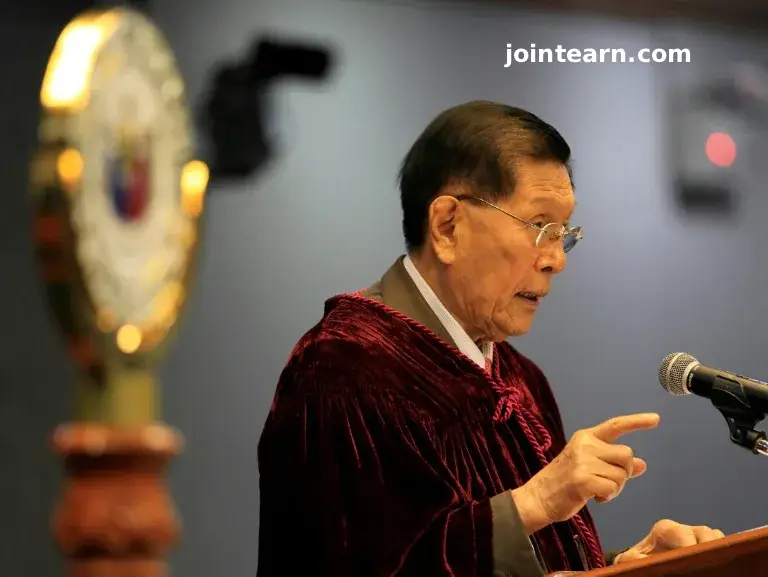
Manila, Philippines — November 13, 2025: Juan Ponce Enrile, one of the most influential and controversial figures in Philippine political history, has died at the age of 101. Known as the architect of martial law under former dictator Ferdinand Marcos Sr., Enrile’s long and tumultuous career spanned more than seven decades — from the darkest years of dictatorship to the modern halls of democracy.
The Death of a Political Titan
According to his daughter, Katrina Ponce Enrile, the former defense minister and Senate president passed away peacefully at home at 4:21 p.m. on Thursday. He had been undergoing treatment for pneumonia. “He died surrounded by our family,” she wrote on Facebook, adding that a public viewing would be held to honor his life and legacy.
The Architect of Martial Law
Enrile, a Harvard-educated lawyer, was a close confidant and top adviser to President Ferdinand Marcos Sr. during the 1970s. He played a pivotal role in the drafting and enforcement of Martial Law in 1972, a move that ushered in one of the most repressive periods in Philippine history.
Under martial law, Enrile served as Defense Minister, wielding enormous power over military and civilian affairs. Thousands of opposition figures, journalists, and activists were arrested, tortured, or killed by state security forces.
Human rights group Amnesty International estimates that tens of thousands were either killed, tortured, or arbitrarily detained during the period. Over 11,000 victims have since been officially recognized and compensated by the Philippine government.
From Loyalist to Rebel: Enrile’s Political Turn
Despite being one of Marcos’s closest allies, Enrile later played a central role in the 1986 People Power Revolution that ended the dictatorship.
In the mid-1980s, as Marcos’s health deteriorated and corruption scandals deepened, Enrile helped organize the Reform the Armed Forces Movement (RAM) — a faction of young military officers dissatisfied with the regime. When the plot to overthrow Marcos was exposed, Enrile and then-General Fidel Ramos barricaded themselves inside military headquarters and called on the public for support.
Millions of Filipinos responded, gathering along Epifanio de los Santos Avenue (EDSA) to protect the rebel soldiers. The uprising became known as the EDSA People Power Revolution, forcing Marcos into exile and restoring democracy under President Corazon Aquino.
Return to Power and Political Longevity
Enrile’s career did not end with Marcos’s fall. He briefly served as Defense Secretary under Aquino before being dismissed amid coup allegations. Despite repeated arrests and corruption charges throughout his career, he managed to reinvent himself multiple times.
He was elected as a senator several times and served as Senate President from 2008 to 2013. Even into his late 90s, Enrile continued to advise the government — most recently as Chief Legal Counsel to President Ferdinand Marcos Jr., the son of the late dictator.
President Marcos Jr. paid tribute to Enrile, calling him “one of the most enduring and respected public servants our country has ever known.” He said Enrile “dedicated his life to serving the Filipino people and guiding the nation through some of its most defining moments.”
Critics Remember the Dark Legacy
Not everyone shared in the praise. Bonifacio Ilagan, a former political prisoner and head of a group representing victims of martial law, said there were “no tears to shed” for the man who “will forever be remembered as one of the chief architects and defenders of tyranny, repression, and corruption.”
Enrile never apologized for his actions during the Marcos era. In interviews, he defended martial law, claiming it was initially successful. “It was operating well from 1972 to 1975, but somehow, a good beginning soured,” he told reporters in 2006.
Scandals, Arrests, and Acquittals
In 2014, Enrile was arrested on plunder charges in connection with a multi-billion-peso corruption scandal known as the pork barrel scam. Due to his advanced age and fragile health, the Supreme Court granted him bail the following year.
The Sandiganbayan anti-graft court later dismissed the plunder case in 2024, and just a month before his death, Enrile was acquitted of all remaining graft charges.
A Life of Contradictions
Born Juanito Furagganan on February 14, 1924, in Cagayan province, Enrile rose from humble beginnings as the illegitimate son of a lawyer to become one of the Philippines’ most powerful political figures.
Throughout his 101 years, he embodied the contradictions of Philippine politics — a man who helped build a dictatorship, overthrew it, and then helped restore its legacy decades later.
His critics will remember him as a symbol of authoritarianism and impunity, while his supporters hail him as a master strategist and survivor who shaped Philippine history like few others.


Leave a Reply